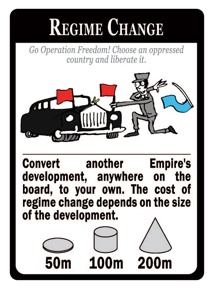October 3, 2006
It was our fault. We brought him down. He seemed to be a perfectly good judge and by all counts was doing a better job than some of his predecessors.
He just made a little slip and we pounced on him.
This trial was supposed to be different. The first trial of Saddam Hussein was a circus. Saddam Hussein and three cronies and four total unknown minor officials were on trial for the brutal crackdown on the Shiite village of Dujail following an assassination attempt on Saddam in 1982.
It was an odd choice to start with, of all of Saddam’s crimes, this was the one to kick off with? Who’s ever heard of Dujail? Only 148 people died in this one, compared to hundreds of thousands in the other cases.
But so it went and soon each session became about Saddam’s half brother, Barzan. A crude showman who still quite hadn’t figured out that it was all over.
He would bluster, roar, then cringing before the judge, who at first just let him talk. Saddam would occasionally sound off too – and of course for us in the press, two words from Saddam would leave pages and pages of notes on Barzan’s rantings discarded on the floor.
The silver haired judge, a Kurd by the name of Rizkar, had a fair bit of patience… but the government didn’t and their’s ran out first. Rizkar abruptly resigned, for “personal reasons”. To this day he has never said the true reason – the one we all know – that the government told him to crack the whip, and he told them to shove it.
So a new judge came in, another Kurd, bald, wizened, sharp-beaked, he was like a tough, old bird of prey with a short temper. Within his first session Barzan was thrown out, Saddam walked out, the defense lawyers mounted a boycott.
High entertainment, at least for the journalists watching this trial day in and day out, but not necessarily in line with anyone’s ideas of what due process should be all about.
But anyway, it finally ended, with a fair bit of relief for everyone – it ended with a whimper, the final statements weren’t from Saddam, but rather from a minor defendant, and one day we just looked at each other in the press gallery and realized that was it. Just a matter of waiting for the verdict on October 16.
Next up, though, was the Anfal trial, the genocide campaign against the Kurds in 1988, that saw over 100,000 Kurds killed, many with poison gas, thousands more imprisoned, whole villages wiped off the map.
This would be a serious trial, there was to mass graves, forensic evidence, diagrams, the whole bit. Dujail – whatever – that was a dress rehearsal. Now this would be a proper court case.
The new judge, Abdallah al-Ameri, a Shiite, presided over a very different court. With Barzan gone, everyone was a bit quieter. The new defendants didn’t mouth off as much and Saddam – mostly – kept a low profile. Everyone was polite.
Among the journalists it was a welcome change, though it meant we had to pay more attention to the witnesses for our story and less to the antics of the defendants.
At the end of the every session, though, the judge would usually give Saddam or one of the other defendants a chance to talk – and Saddam would make some pronouncement like if he was still in charge the country, it wouldn’t be such a mess.
So then the grumblings started, from the prosecutors of all people, one even burst out in court that the judge was being too sympathetic to the defendant.
Bit shocking really, I mean not telling someone to shut up and sit down all the time isn’t being sympathetic. Besides, maybe being allowed to mouth off every now and then kept the defendants a little more passive.
They’re going to hang them anyway.
So the next session, the angry prosecutor was relegated to a back seat and that was that.
Except for one little off hand comment that very few people heard.
One of the witnesses described how he sent a petition to Saddam to find out what had happened to his family. When it came to his turn to question the witness (defendants get to question the witness, it’s bizarre), Saddam said, if I was such a dictator, why were you allowed to appeal to me?
It was a pointless question, and enraged the witness, so the judge decided to calm things down, and said (dismissively) to Saddam “no, you weren’t a dictator, sometimes it’s just the people around one that make one seem to be a dictator.” Perhaps sarcastic? Whatever it was, it was offhand.
Everyone had it in their notes, but only AP passed it on to their desker and then that became the top of the story.
Just to back up a bit, the way the wires cover the trial – since we have to be filing information throughout – is that we take notes and then periodically send them from the press room to our editors (via Yahoo Messenger, as it turns out). Back at the office, there is a desker who receives the quotes and the description and then writes the actual story.
I’ve done both ends and the simple formula is, find the quote, and the fact or two that will make an attractive interesting story. Basically you need two or three quotes from the unhappy witness (my family was gassed, I saw the dead bodies, and then they beat us some more, whatever) and the Saddam quote. There is always one good quote from him every trial and it usually leads the story, unless there is a something particularly awful described in court like a rape or a child dying.
Those who don’t follow this callous (was that a whiff of evil?) formula, will find the next day that the newspapers have chosen the competition’s articles.
So the word came down the line, “AP’s leading with a dictator quote, do you have it?” So the other wires, went back through their notes (and perhaps maybe, in exasperation, asked the AP guy) and dutifully delivered up the requisite quote.
And where the wires go, the rest of the media will follow. It doesn’t matter what the other TV, newspaper reporters saw or heard, their editors will be sitting there looking at the wire copy that came out during the trial, saying “do you have the dictator quote?”
And of course the Iraqi media, follow the wires as well.
So that was the story the next day, not about the Kurds who suffered, or how well run the trial was, but that the judge thought Saddam wasn’t really a dictator.
For two days the government went out of their way to say the judiciary was independent and they would respect that.
And then on the third day they fired him.
The funniest part was the American advisors to the court, a rather righteous bunch of characters, whose main role, as far as we can tell, is to convince the media that the trial isn’t really a travesty of justice. It’s an Iraqi process.
So the night the judge is fired we called them up and they swore up and down that the old judge would be there the next day. And the next day he wasn’t and they were spinning it along explaining how it was all within Iraqi laws.
“To say that removing a single judge out of a panel of five besmirches the whole process is a bit premature,” said an advisor to us angrily. Right. When the lead judge gets fired by the government for the second trial in a row, that’s nothing to worry about.
Now don’t get me wrong. I don’t like Saddam, or the toads and psychopaths he surrounded himself with. But there are principles here somewhere. There is an ideal of due process.
When you watch these badly managed stage shows that are just clearly unfair, you start thinking – he was only reacting to an assassination attempt, I mean wouldn’t that annoy anyone? And after all, the Kurds were rebelling and he was just using the same counter insurgency techniques of strategic hamlets and free-fire zones the Americans used in Vietnam – albeit to rather extreme degree…
Anyway, what do I care, all that matters is the quote.
So the new judge came in, and on his first day he ejected Saddam, the defense lawyers walked out and at one point, the judge even threw out all of the defendants and then went on to hear the rest of the witnesses in an front of an empty dock.



